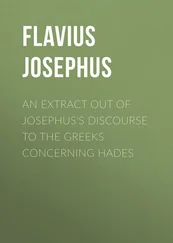Flavius Josephus - Antiquities of the Jews
Здесь есть возможность читать онлайн «Flavius Josephus - Antiquities of the Jews» — ознакомительный отрывок электронной книги совершенно бесплатно, а после прочтения отрывка купить полную версию. В некоторых случаях можно слушать аудио, скачать через торрент в формате fb2 и присутствует краткое содержание. Жанр: foreign_prose, История, foreign_edu, foreign_antique, на английском языке. Описание произведения, (предисловие) а так же отзывы посетителей доступны на портале библиотеки ЛибКат.
- Название:Antiquities of the Jews
- Автор:
- Жанр:
- Год:неизвестен
- ISBN:нет данных
- Рейтинг книги:5 / 5. Голосов: 1
-
Избранное:Добавить в избранное
- Отзывы:
-
Ваша оценка:
- 100
- 1
- 2
- 3
- 4
- 5
Antiquities of the Jews: краткое содержание, описание и аннотация
Предлагаем к чтению аннотацию, описание, краткое содержание или предисловие (зависит от того, что написал сам автор книги «Antiquities of the Jews»). Если вы не нашли необходимую информацию о книге — напишите в комментариях, мы постараемся отыскать её.
Antiquities of the Jews — читать онлайн ознакомительный отрывок
Ниже представлен текст книги, разбитый по страницам. Система сохранения места последней прочитанной страницы, позволяет с удобством читать онлайн бесплатно книгу «Antiquities of the Jews», без необходимости каждый раз заново искать на чём Вы остановились. Поставьте закладку, и сможете в любой момент перейти на страницу, на которой закончили чтение.
Интервал:
Закладка:
3. I found, therefore, that the second of the Ptolemies was a king who was extraordinarily diligent in what concerned learning, and the collection of books; that he was also peculiarly ambitious to procure a translation of our law, and of the constitution of our government therein contained, into the Greek tongue. Now Eleazar the high priest, one not inferior to any other of that dignity among us, did not envy the forenamed king the participation of that advantage, which otherwise he would for certain have denied him, but that he knew the custom of our nation was, to hinder nothing of what we esteemed ourselves from being communicated to others. Accordingly, I thought it became me both to imitate the generosity of our high priest, and to suppose there might even now be many lovers of learning like the king; for he did not obtain all our writings at that time; but those who were sent to Alexandria as interpreters, gave him only the books of the law, while there were a vast number of other matters in our sacred books. They, indeed, contain in them the history of five thousand years; in which time happened many strange accidents, many chances of war, and great actions of the commanders, and mutations of the form of our government. Upon the whole, a man that will peruse this history, may principally learn from it, that all events succeed well, even to an incredible degree, and the reward of felicity is proposed by God; but then it is to those that follow his will, and do not venture to break his excellent laws: and that so far as men any way apostatize from the accurate observation of them, what was practical before becomes impracticable 5 5 ( return ) [ Josephus here plainly alludes to the famous Greek proverb, If God be with us, every thing that is impossible becomes possible.] 6 ( return ) [ As to this intended work of Josephus concerning the reasons of many of the Jewish laws, and what philosophical or allegorical sense they would bear, the loss of which work is by some of the learned not much regretted, I am inclinable, in part, to Fabricius's opinion, ap. Havercamp, p. 63, 61, That "we need not doubt but that, among some vain and frigid conjectures derived from Jewish imaginations, Josephus would have taught us a greater number of excellent and useful things, which perhaps nobody, neither among the Jews, nor among the Christians, can now inform us of; so that I would give a great deal to find it still extant."]
and whatsoever they set about as a good thing, is converted into an incurable calamity. And now I exhort all those that peruse these books, to apply their minds to God; and to examine the mind of our legislator, whether he hath not understood his nature in a manner worthy of him; and hath not ever ascribed to him such operations as become his power, and hath not preserved his writings from those indecent fables which others have framed, although, by the great distance of time when he lived, he might have securely forged such lies; for he lived two thousand years ago; at which vast distance of ages the poets themselves have not been so hardy as to fix even the generations of their gods, much less the actions of their men, or their own laws. As I proceed, therefore, I shall accurately describe what is contained in our records, in the order of time that belongs to them; for I have already promised so to do throughout this undertaking; and this without adding any thing to what is therein contained, or taking away any thing therefrom.
4. But because almost all our constitution depends on the wisdom of Moses, our legislator, I cannot avoid saying somewhat concerning him beforehand, though I shall do it briefly; I mean, because otherwise those that read my book may wonder how it comes to pass, that my discourse, which promises an account of laws and historical facts, contains so much of philosophy. The reader is therefore to know, that Moses deemed it exceeding necessary, that he who would conduct his own life well, and give laws to others, in the first place should consider the Divine nature; and, upon the contemplation of God's operations, should thereby imitate the best of all patterns, so far as it is possible for human nature to do, and to endeavor to follow after it: neither could the legislator himself have a right mind without such a contemplation; nor would any thing he should write tend to the promotion of virtue in his readers; I mean, unless they be taught first of all, that God is the Father and Lord of all things, and sees all things, and that thence he bestows a happy life upon those that follow him; but plunges such as do not walk in the paths of virtue into inevitable miseries. Now when Moses was desirous to teach this lesson to his countrymen, he did not begin the establishment of his laws after the same manner that other legislators did; I mean, upon contracts and other rights between one man and another, but by raising their minds upwards to regard God, and his creation of the world; and by persuading them, that we men are the most excellent of the creatures of God upon earth. Now when once he had brought them to submit to religion, he easily persuaded them to submit in all other things: for as to other legislators, they followed fables, and by their discourses transferred the most reproachful of human vices unto the gods, and afforded wicked men the most plausible excuses for their crimes; but as for our legislator, when he had once demonstrated that God was possessed of perfect virtue, he supposed that men also ought to strive after the participation of it; and on those who did not so think, and so believe, he inflicted the severest punishments. I exhort, therefore, my readers to examine this whole undertaking in that view; for thereby it will appear to them, that there is nothing therein disagreeable either to the majesty of God, or to his love to mankind; for all things have here a reference to the nature of the universe; while our legislator speaks some things wisely, but enigmatically, and others under a decent allegory, but still explains such things as required a direct explication plainly and expressly. However, those that have a mind to know the reasons of every thing, may find here a very curious philosophical theory, which I now indeed shall wave the explication of; but if God afford me time for it, I will set about writing it 6 6 ( return ) [ As to this intended work of Josephus concerning the reasons of many of the Jewish laws, and what philosophical or allegorical sense they would bear, the loss of which work is by some of the learned not much regretted, I am inclinable, in part, to Fabricius's opinion, ap. Havercamp, p. 63, 61, That "we need not doubt but that, among some vain and frigid conjectures derived from Jewish imaginations, Josephus would have taught us a greater number of excellent and useful things, which perhaps nobody, neither among the Jews, nor among the Christians, can now inform us of; so that I would give a great deal to find it still extant."]
after I have finished the present work. I shall now betake myself to the history before me, after I have first mentioned what Moses says of the creation of the world, which I find described in the sacred books after the manner following.
Интервал:
Закладка:
Похожие книги на «Antiquities of the Jews»
Представляем Вашему вниманию похожие книги на «Antiquities of the Jews» списком для выбора. Мы отобрали схожую по названию и смыслу литературу в надежде предоставить читателям больше вариантов отыскать новые, интересные, ещё непрочитанные произведения.
Обсуждение, отзывы о книге «Antiquities of the Jews» и просто собственные мнения читателей. Оставьте ваши комментарии, напишите, что Вы думаете о произведении, его смысле или главных героях. Укажите что конкретно понравилось, а что нет, и почему Вы так считаете.












